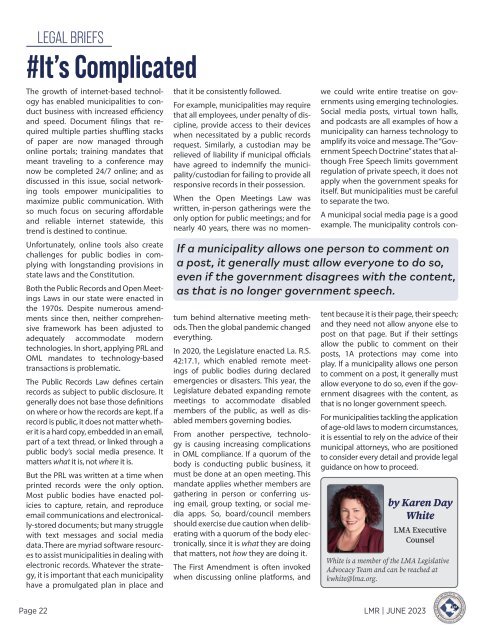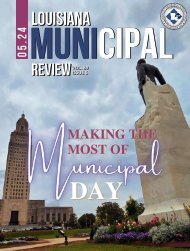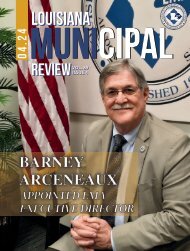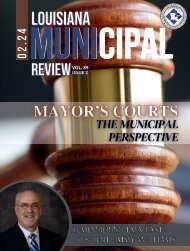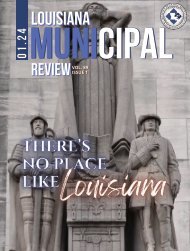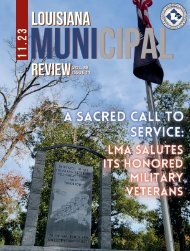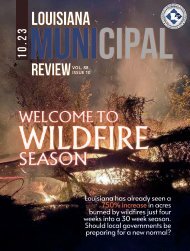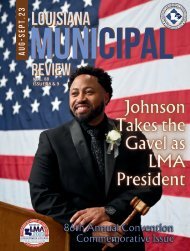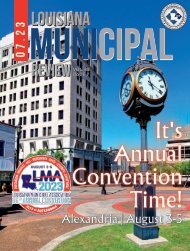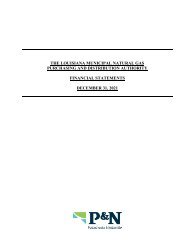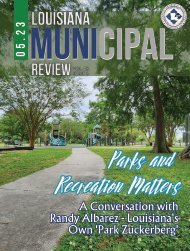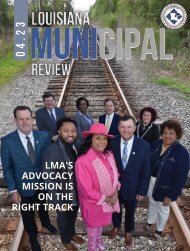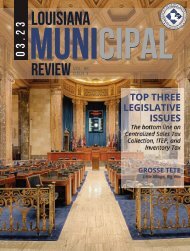LMR June 2023 FINAL
You also want an ePaper? Increase the reach of your titles
YUMPU automatically turns print PDFs into web optimized ePapers that Google loves.
LEGAL BRIEFS<br />
#It’s Complicated<br />
The growth of internet-based technology<br />
has enabled municipalities to conduct<br />
business with increased efficiency<br />
and speed. Document filings that required<br />
multiple parties shuffling stacks<br />
of paper are now managed through<br />
online portals; training mandates that<br />
meant traveling to a conference may<br />
now be completed 24/7 online; and as<br />
discussed in this issue, social networking<br />
tools empower municipalities to<br />
maximize public communication. With<br />
so much focus on securing affordable<br />
and reliable internet statewide, this<br />
trend is destined to continue.<br />
Unfortunately, online tools also create<br />
challenges for public bodies in complying<br />
with longstanding provisions in<br />
state laws and the Constitution.<br />
Both the Public Records and Open Meetings<br />
Laws in our state were enacted in<br />
the 1970s. Despite numerous amendments<br />
since then, neither comprehensive<br />
framework has been adjusted to<br />
adequately accommodate modern<br />
technologies. In short, applying PRL and<br />
OML mandates to technology-based<br />
transactions is problematic.<br />
The Public Records Law defines certain<br />
records as subject to public disclosure. It<br />
generally does not base those definitions<br />
on where or how the records are kept. If a<br />
record is public, it does not matter whether<br />
it is a hard copy, embedded in an email,<br />
part of a text thread, or linked through a<br />
public body’s social media presence. It<br />
matters what it is, not where it is.<br />
But the PRL was written at a time when<br />
printed records were the only option.<br />
Most public bodies have enacted policies<br />
to capture, retain, and reproduce<br />
email communications and electronically-stored<br />
documents; but many struggle<br />
with text messages and social media<br />
data. There are myriad software resources<br />
to assist municipalities in dealing with<br />
electronic records. Whatever the strategy,<br />
it is important that each municipality<br />
have a promulgated plan in place and<br />
that it be consistently followed.<br />
For example, municipalities may require<br />
that all employees, under penalty of discipline,<br />
provide access to their devices<br />
when necessitated by a public records<br />
request. Similarly, a custodian may be<br />
relieved of liability if municipal officials<br />
have agreed to indemnify the municipality/custodian<br />
for failing to provide all<br />
responsive records in their possession.<br />
When the Open Meetings Law was<br />
written, in-person gatherings were the<br />
only option for public meetings; and for<br />
nearly 40 years, there was no momentum<br />
behind alternative meeting methods.<br />
Then the global pandemic changed<br />
everything.<br />
In 2020, the Legislature enacted La. R.S.<br />
42:17.1, which enabled remote meetings<br />
of public bodies during declared<br />
emergencies or disasters. This year, the<br />
Legislature debated expanding remote<br />
meetings to accommodate disabled<br />
members of the public, as well as disabled<br />
members governing bodies.<br />
From another perspective, technology<br />
is causing increasing complications<br />
in OML compliance. If a quorum of the<br />
body is conducting public business, it<br />
must be done at an open meeting. This<br />
mandate applies whether members are<br />
gathering in person or conferring using<br />
email, group texting, or social media<br />
apps. So, board/council members<br />
should exercise due caution when deliberating<br />
with a quorum of the body electronically,<br />
since it is what they are doing<br />
that matters, not how they are doing it.<br />
The First Amendment is often invoked<br />
when discussing online platforms, and<br />
we could write entire treatise on governments<br />
using emerging technologies.<br />
Social media posts, virtual town halls,<br />
and podcasts are all examples of how a<br />
municipality can harness technology to<br />
amplify its voice and message. The “Government<br />
Speech Doctrine” states that although<br />
Free Speech limits government<br />
regulation of private speech, it does not<br />
apply when the government speaks for<br />
itself. But municipalities must be careful<br />
to separate the two.<br />
If a municipality allows one person to comment on<br />
a post, it generally must allow everyone to do so,<br />
even if the government disagrees with the content,<br />
as that is no longer government speech.<br />
A municipal social media page is a good<br />
example. The municipality controls content<br />
because it is their page, their speech;<br />
and they need not allow anyone else to<br />
post on that page. But if their settings<br />
allow the public to comment on their<br />
posts, 1A protections may come into<br />
play. If a municipality allows one person<br />
to comment on a post, it generally must<br />
allow everyone to do so, even if the government<br />
disagrees with the content, as<br />
that is no longer government speech.<br />
For municipalities tackling the application<br />
of age-old laws to modern circumstances,<br />
it is essential to rely on the advice of their<br />
municipal attorneys, who are positioned<br />
to consider every detail and provide legal<br />
guidance on how to proceed.<br />
by Karen Day<br />
White<br />
LMA Executive<br />
Counsel<br />
White is a member of the LMA Legislative<br />
Advocacy Team and can be reached at<br />
kwhite@lma.org.<br />
Page 22<br />
<strong>LMR</strong> | JUNE <strong>2023</strong>


